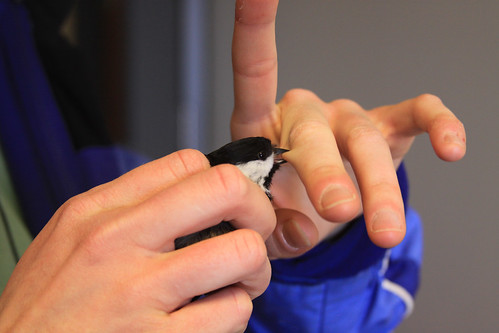The CDC is currently warning people to not handle birds in their bare hands because of the salmonella outbreak associated with bird feeding where finches have been abundant this winter. When I was a rehabber, I never wore gloves when handling injured birds except raptors, and I occasionally made exceptions even then.
 |
| Great Gray Owls hunt almost exclusively for voles. Their toes and claws may be long, but are not powerful enough to do much damage. |
Despite not wearing gloves so often, I was virtually always good about handwashing. I say “virtually” because one time I wasn’t, and sure enough, I got very sick. That was when I was in Costa Rica with a birding group. We were dining at an outdoor restaurant when a Blue-gray Tanager crashed into a window. Our guide picked it up and handed it to me. The bird was stunned but didn’t seem to have any other injuries, so I let it sit on my left index finger as I ate with my right hand. I doubt if that would have gotten me sick, but at one point the tanager pooped on my left hand. Being very interested in avian digestion, I was fascinated with this frugivorous bird’s gelatinous dropping, glistening and translucent. When the tanager took off, I wiped my left hand with a paper napkin and forgot all about it, not once thinking about the hand sanitizer right there in my pocket. I was violently sick that night, but oh, well—live and learn. I got some nice photos of the tanager and an excellent cautionary tale.
I was still rehabbing at the time, ordering 10,000 mealworms by mail order every couple of months. They came in woven bags filled with loosely wadded newspaper, and because newsprint is toxic, I transferred them to ice cream buckets with dry oats as soon as possible. One summer, I started doing that on our backyard picnic table, and even without whistling, my chickadees recognized me and flew in for handouts.
Over the years, a few Red-breasted Nuthatches have come to my hand, and once a White-breasted Nuthatch, but that poor male was so skittish that I felt sorry for him, so after the one time, when I saw him I’d quickly put the mealworms in the feeder and close the window. I don’t think I’ve ever washed my hands specifically because I hand-fed any of these birds.
I suppose there may be some risk from a healthy siskin or redpoll perched on our fingers because ground feeders probably do step on some pretty germy substrates, but chickadees and nuthatches spend very little time on the ground. I’d often go right back to my computer after feeding them, so when I did eventually wash my hands, any germs were probably already on the keyboard to re-infect me.
I pretty much always wash my hands after dealing with bird feeders, and what with having a baby grandson who keeps grabbing my fingers and putting them in his mouth, I’m washing my hands way more than normal anyway, not even counting the pandemic. I’ve been keeping 6 feet from people even when wearing a face mask for the past year and would never dream of touching a human being right now, but somehow chickadees seem from a different, germ-free universe. All those hygienic habits I’ve developed during this pandemic have kept me safer from ordinary germs—no colds or flu in our house at all this year!—but if it weren’t for my baby grandson,I’d probably still be just as lackadaisical about hygiene.
I may not follow CDC guidelines with regard to chickadees on my fingers, but I always wash my hands before picking the baby up. Then again, I’m not worried about Walter exposing me to germs—I’m worried about me exposing him to germs, while I’ve never worried about giving chickadees germs any more than I’ve worried about them giving me germs.
So far, I’ve never heard of a single real life case in the history of the universe in which either a person’s germs got a chickadee sick or a chickadee’s germs got a person sick. If I ever do, I’ll be sure to let you know.
 |
| Chickadees may not be at all dangerous when they come to our hands of their own volition, but beware if you grab one against its wishes! |

